The Treeck Laboratory | The Cell Biology of Host - Pathogen Interactions
Lab Members
Moritz Treeck | Group Leader

Broadly speaking, I am really interested to understand how host- pathogen interaction works on multiple levels. The parasites we work with, Plasmodium falciparum and Toxoplasma gondii both evolved to excel at infecting and modifying host cells and a huge proportion of the proteins important for these processes are poorly characterized. I very much enjoy working with a team of talented and enthusiastic individuals in the lab to unravel the complexity of host pathogen interaction. Often this involves the development of new methods to overcome challenges. The scientific environment of the Gulbenkian Institute of Science (IGC) provides us with an outstanding intellectual environment and superbe technical support facilities.
Biography: Moritz was born in the rainy city of Hamburg in northern Germany and I almost ended up as a lawyer. He prepared two applications, one for law and one for biology, and inserted one application blind-folded into the post-box. Law was still in his hands and he is thankful for this until the very day. Throughout his academic career he was interested in parasites and has tried to attract as many as possible during extensive travels to Central America and South-East Asia. However, it was not until he met my future PhD advisor Tim Gilberger during a semester in Melbourne, Australia, where he got hooked working with malaria. He spent his PhD thesis at the Bernhard-Nocht Institute for Tropical Medicine in Hamburg, Germany, studying protein trafficking and invasion of red blood cells by the malaria parasite. After that he moved to John Boothroyd’s lab in Stanford, California to learn as much as he could about another really interesting parasite, Toxoplasma. After 4 years he returned to Europe to join the Francis Crick institute where he ran his lab for ~10 years before relocating to the Gulbenkian Institute of Science, now GIMM, where exciting science and sunshine meet (almost) every day!

Stephanie Nofal | Wellcome Trust Early Career Fellow
How do P. falciparum gametocytes remodel their host cell?
Gametocytes are the only stage of the malaria lifecycle that can be transmitted from humans to mosquitos to sustain disease transmission. Prior to being taken up by mosquitos, immature gametocytes sequester to the bone marrow where they extensively remodel the host cell in which they reside. However, the parasite effectors responsible for these critical remodelling events remain to be identified. I am currently investigating how exported parasite effectors are responsible for subverting the host cell.
Stephanie completed her PhD in David Baker’s lab at the London School of Hygiene & Tropical Medicine, where she worked on cyclic nucleotide signalling and molecular motor function in the malaria parasite.


Stephanie Nofal
Gametocyte exported effectors required for host cell remodelling

Hugo Belda | Senior Post-doctoral Researcher
What is the function of post-translational modification in host cell remodelling by Plasmodium falciparum?
P. falciparum exports a large number of proteins out into its host red blood cell. These proteins drive the transformation of red blood cells from oxygen-transporting cells with no nucleus and little of a typical cell’s internal machinery into a parasite-production facility that causes all of malaria’s most severe symptoms. We and others have found that many of these exported proteins are phosphorylated, but the kinases responsible are not currently known and - most importantly - the functional consequences are a mystery. I am using quantitative phoshoproteomic methods and am developing new genetic tools to try and figure out how P. falciparum uses post-translational modification to take over red blood cells and cause disease.


Hugo Belda
Function of post-translational modifications in host cell remodelling

Franziska Hildebrandt | Wenner-Gren Postdoctoral Fellow
How do Toxoplasma effector proteins reprogram the host cell?
Toxoplasma secretes a large number of effector proteins into its host cell which inhibit immune responses to the parasite and reprogram host transcription, but how these effectors work in the context of the different parasite strain and host species pairings is not understood. I am using our recently developed Dual-PerTurbSeq to identify and characterise effector proteins that influence host reprogramming across the tree of life.
Franziska obtained her PhD in the Ankarklev lab at the University of Stockholm studying transcriptonal responses in the liver to Plasmodium infection using spatial transcriptomics.
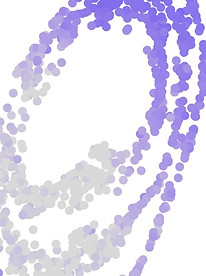

Franziska Hildebrandt
Reprogramming of the host cell by Toxoplasma gondii
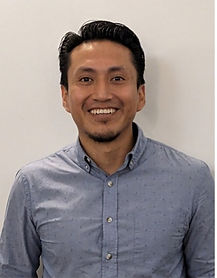
David Anaguano | Marie Skłodowska-Curie Postdoctoral fellow
How does P. falciparum sense its environment? Plasmodium falciparum parasites export a great number of proteins to remodel their host red blood cells (RBC’s). Among these modifications, RBC rigidification and cytoadhesion to endothelial cells are important to avoid parasite clearance. Some of the modifications are regulated by a family of exported atypical FIKK kinases, but how the kinases are regulated is not known. My work will focus on understanding the mechanisms some of these FIKK kinases use to sense changes in the environment, as well as investigating the role of some of the non-exported FIKK kinases.
David obtained his PhD in the lab of Vasant Muralidharan, at the University of Georgia

Eloise Lockyer
Human-specific Toxoplasma effectors
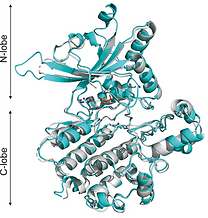

Gwendolin Fuchs | PhD Student
How are P. falciparum surface antigens trafficked in the host cytosol compartment? Upon invasion of the red blood cell, P. falciparum exports numerous proteins to the host cell surface to interact with its surroundings. This, for example, includes the key virulence factor PfEMP1 which mediates cytoadhesion to endothelial cells preventing splenic clearance of the infected cell. Key structures of protein export like Maurer’s Clefts and the translocon PTEX are well characterised, however, it remains unclear how surface antigens are trafficked in the host cytosol compartment. I am using a proximity labelling approach to identify cytosolic proteins involved in the trafficking of different surface antigens.
Gwen is funded through an individual FCT fellowship.

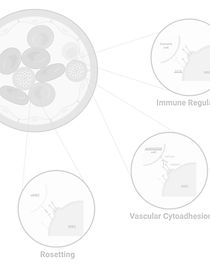
Gwendolin Fuchs
Trafficking of antigens to the surface of Plasmodium falciparum-infected cells

Ana Matias | PhD Student
How can Toxoplasma subvert the host cytoskeleton?
After invasion of a host cell, Toxoplasma’s vacuole is surrounded by host microtubules. This phenotype seems to be driven by the parasite. However, how and why the parasites surrounds itself with host microtubules is not clear. My goals are to find the Toxoplasma effector(s) responsible for this ability to subvert the host microtubule cytoskeleton, and to explore how Toxoplasma benefits from it.
Ana is funded through an individual FCT fellowship.
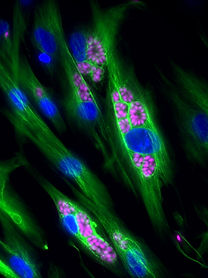

Ana Matias
Subversion of host cell cytoskeleton by Toxoplasma gondii

Diogo Fonseca | Post-doctoral Researcher
How does Toxoplasma modulate host immune responses to favour parasite dissemination?
Immune cells release key soluble mediators that initiate inflammation and orchestrate the immune response upon infection. These chemical messengers trigger a series of events including the recruitment of specialised immune cell types into infected sites, and the activation of molecular antimicrobial mechanisms, to ultimately restrict pathogens and curtail infection. Toxoplasma-infected immune cells alter their behaviour at a cellular and secretory level as a consequence of infection. How these changes affect local and systemic immune responses, and how this benefits the parasite is poorly understood. I leverage on several newly identified Toxoplasma effector proteins that alter host cell transcription to investigate this, using in vivo and ex vivo models of toxoplasmosis.
Diogo completed his PhD in Immunology at Selinda Orr’s and Phillip Taylor’s Lab at Cardiff University, where he assessed how clinically relevant fungal pathogens affect the host immune response during infection.
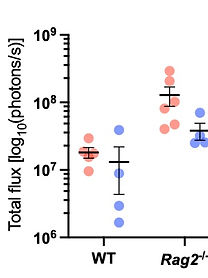
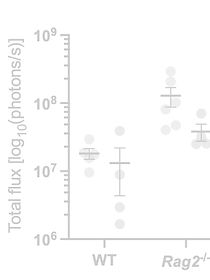
Diogo Fonseca
Changes in immune cell function following infection by Toxoplasma parasites

Nuno Carmo | Lab Manager
How do we provide the best working environment in the lab?
The complexity of host-pathogen interactions requires a multidisciplinary approach, advanced techniques and relevant models. In our team, we explore Plasmodium falciparum and Toxoplasma gondii, making our work doubly fascinating.
As a Lab Manager, Nuno supports and is committed to facilitating scientific excellence, safety, and efficiency through our shared passion for discovery and innovation.
Nuno completed his PhD at the University of Lisbon working on Mycobacterium tuberculosis host-pathogen interaction.
Nuno completed his PhD at the University of Lisbon working on Mycobacterium tuberculosis host-pathogen interaction.


Nuno Carmo
Making the lab run smoothly!
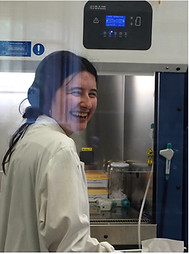
Carolina Albino | Lab research scientist
How does Toxoplasma alter host cells?
Carolina is interested in how Toxoplasma alters host cells by secreted proteins. Specifically, she is interested in the essential aspects of host-cell remodling.
Carolina completed her Master's degree at the LHSTM in London


Nuno Carmo
Making the lab run smoothly!

Catarina Rosa | EMBO Postdoctoral fellow
How does Toxoplasma manipulate the host cell across its life cycle?
A large body of evidence has highlighted the ability of Toxoplasma acute stages – the tachyzoites - to export effector proteins which modulate various host signaling pathways to favor intracellular survival. Recently, our lab developed a method that couples a pooled CRISPR-Cas9 knockout screening with dual host–parasite single-cell RNA-sequencing, termed Dual-perturb-seq. It allowed to identify, in a high throughput fashion, novel tachyzoite effectors and their role in host cell reprogramming. However, interactions between other stages of Toxoplasma complex life cycle and its host cell remain largely understudied. I aim to expand the application of the Dual-Perturb-seq to other parasite stages and uncover less explored host-parasite interactions!
Catarina completed her PhD at the in Jessica Bryant's lab at the Pasteur Institute in Paris.
_tif.png)

Catarina Rosa
Host cell subversion during the chronic stages of toxoplasmosis
Christian Gnann | Swedish Research Council Post-doctoral Fellow
How does heteregeneity of host cells affect infection outcome?
Single-cell heterogeneity is an evolutionary conserved mechanism in cell biology. Cells exist in a variety of cellular states defined by differences in for example their cell cycle position, microenvironment, morphology as well as their metabolic and signalling potential. Interestingly, toxoplasma infection and potential clearance vary between individual host cells. The reasons for this remain unknown but we suggest a role of the cellular state at the time of infection on the outcome of infection. Therefore, we aim to characterize the interplay between the parasite and the host cell in heterogenous single-cell populations using high throughput imaging screens.
Chris completed his PhD in Emma Lundberg's lab at the KTH Royal Institute of Technology In Stockholm.
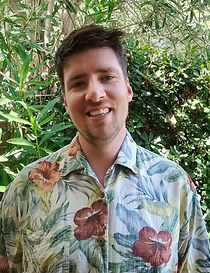

Mónica Franco | PhD student
How does FIKK13 specifically disrupt host signaling pathways?
Plasmodium falciparum parasites infect and actively remodel red blood cells (RBCs) by exporting virulence factors, such as the FIKK kinase family. Unlike all other serine/threonine FIKK kinases, our laboratory surprisingly showed that FIKK13 is a tyrosine kinase. FIKK13 likely uniquely evolved to modulate host signaling pathways reliant on tyrosine phosphorylation, which may be important during the stages where the parasite can invade nucleated cells, such as in the gametocyte stage. In particular, I am interested in studying the role of FIKK13 in gametocyte development inside red blood cells nucleated precursors, called erythroblasts. Gametocyte biology is far less understood than the blood-stage asexual stages. Thus, further elucidating Plasmodium sexual stage, responsible for Malaria transmission, will be critical for developing new transmission-blocking strategies, aiding Malaria eradication efforts.
Mónica obtained her Master's in Medical Microbiology from Universidade NOVA de Lisboa. Mónica is funded through an individual FCT fellowship.
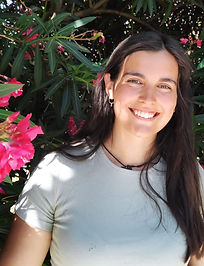
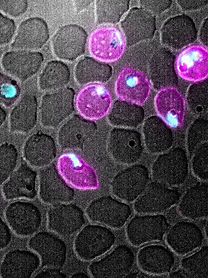

Henrique Ramos | Technician (supervised by Stephanie Nofal)
What is the role of Maurer’s clefts in Plasmodium falciparum gametocytes?
To survive and develop within red blood cells P. falciparum must extensively remodel its host cell. This process in the asexual stages is mediated, in part, by parasite-induced membranous structures called Maurer’s clefts. These act as trafficking hubs, directing parasite proteins to the red blood cell surface. Gametocytes, the sexual stage of this parasite, are indispensable for transmission to the mosquito vector. Furthermore, the role of Maurer’s clefts in this stage remains far less understood. As such, I am interested in studying how Maurer’s cleft proteins differ in gametocytes compared to the asexual stages.
Henrique completed his master’s degree in Biochemistry from the Faculty of Sciences of Porto University.

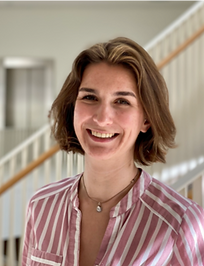
Elena Christ | Master student (supervised by Stephanie Nofal)
Which proteins are expressed on the surface of P. falciparum gametocyte infected red blood cells?
Plasmodium falciparum gametocytes differ immensely in their gene and protein expression from the asexual blood stages. Even though we know many proteins that are trafficked onto the surface of their host cells by the asexual blood stages, we know very little about the proteins that gametocytes display on or remove from the red blood cell surface. I will apply different proteomic approaches to profile the surface proteome of the gametocyte-infected red blood cells and characterize its importance to the parasite.
Elena is a Master student from the Technical University of Munich.


You! | Postdoctoral position
Do you want to study how parasites remake their host cells?
We are frequently looking for postdoc candidates with an interest in host-parasite interactions. To join the lab outside open calls it is important to get in touch well in advance before you would like to join.
Send me a CV and short letter describing the research you would like to perform in our team to start a conversation.

